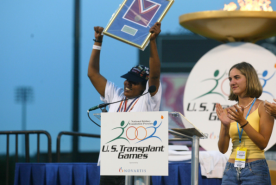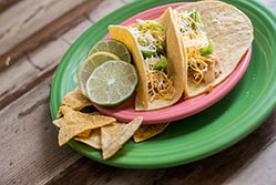April 15, 2022
According to research published in the American Journal of Kidney Diseases, people with kidney disease who consume more plant protein have a lower risk of death. Even a 33% increase in the ratio of plant protein to total protein has shown benefits.
In this episode of Hot Topics, Brittany Sparks, registered dietitian and board-certified specialist in renal nutrition, and Eric Singer, a whole-foods, plant-based diet advocate living with focal segmental glomerulosclerosis (FSGS), discuss the many benefits of plant-based diets. They also bust some common myths people may have about kidney disease and eating plant-based diets.
Eric’s road to a plant-based diet
Eric was first diagnosed with secondary FSGS and stage 3 kidney disease in 2007, after having routine lab work done before starting college.
During college, he didn’t experience any symptoms. However, this unexpectedly changed in December 2020 when his estimated glomerular filtration rate (eGFR) went from 25 to the mid-teens within a month or two.
He began to experience nausea and fatigue and struggled to keep up with his two young children. Eric knew he had to make some changes. While he initially pushed for a transplant, his healthcare team’s goal was for Eric to keep his kidneys functioning well for as long as possible.
To do so, they introduced Eric to Brittany who showed him the power of a whole-food, plant-based diet.
Myth-busting
Before we look into how this diet is helpful, let’s see about some common myths.
Myth 1: People on dialysis can’t go on plant-based diets.
There was a time when plant-based foods were frowned upon, but now the gears have entirely shifted. As long as a kidney dietitian helps create an individualized plan, plant-based diets are appropriate for people with end-stage kidney disease or kidney failure.
Learn about nutrition and peritoneal dialysis or hemodialysis.
Myth 2: People on plant-based diets aren’t well-nourished and don’t get enough protein.
Protein is made up of 20 amino acids, and nine of those are considered essential, meaning our body cannot produce it. Twenty years ago, it was believed that animal proteins were superior because they provided all 20 while plant proteins are usually missing one.
Now we know plant protein is just as valuable, and there is a lower risk of malnutrition if the diet is well-planned and varied.
Learn about plant-based proteins.
Myth 3: People with kidney disease shouldn’t eat whole grains.
Whole, intact grain is full of fiber, antioxidants, vitamins, and minerals. All these nutrients are stripped during the refining process to make white flour. While whole grain flour has more potassium and phosphorus than white flour, the actual amounts are still pretty low.
For example, there’s only a 30-milligram difference in the amount of potassium that is in oatmeal compared to the amount in cream of rice cereal.
Learn about the nutritional benefits of whole grains.
Benefits of a plant-based diet
Why is a plant-based diet effective in people with kidney disease?
- Phosphorus: Humans absorb 70% of animal-based phosphorus but only 40% from plant-based sources.
- Acid load: When we eat food, some acids are produced by our metabolism. As kidney function declines, it becomes harder to filter out these acids, which can cause additional damage. Fruits and vegetables have a much lower or neutral acid load when compared to animal-based protein.
- Dietary fiber: People who consume dietary fiber have been shown to have fewer uremic toxins, another byproduct of metabolism. If these toxins aren’t removed, people may experience uremic syndrome with symptoms like fatigue and nausea.
- Antioxidants: Antioxidants are abundant in plant-based foods and help protect cells from damage.
- Heart-healthy: Compared to meat, plant-based foods are generally lower in fat, saturated fat, and cholesterol.
Learn more about creating a plant-based diet.
Where is Eric now?
Eric took this process one step at a time. It wasn’t reasonable for Eric to wake up the next day and be an expert in nutritious eating patterns. Instead, he focused on making small changes like swapping out meat with a plant-based food at dinner.
Once he began to feel better and saw his lab results improve, it became even easier to follow through.
Eric’s kidneys are still functioning, and he now advocates for a plant-based diet.


















